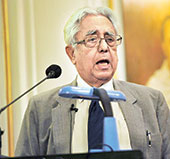 |
| Tapan Raychaudhuri at the Bengal Club Library Talk. Picture by Anindya Shankar Ray |
The Bengal Club, in association with The Telegraph, presented, as part of its Bengal Club Library Talk series, a lecture by historian Tapan Raychaudhuri on the long-term trends in Indian politics.
Professor Raychaudhuri, who was professor of Indian history and civilisation, Oxford University, and fellow (now fellow emeritus) at St. Anthony’s College, Oxford, has to his credit several distinguished works spanning six decades.
Rudrangshu Mukherjee of The Telegraph, who was Raychaudhuri’s student at Oxford, paid a tribute to his mentor — who, among his innumerable achievements, is National Professor, India, and a recipient of the Padma Bhushan — setting the stage for a glimpse into “contemporary history, historicised, from the point of view of a historian”.
Bharati Ray, who chaired the event on December 14, called Raychaudhuri “a historian and a historian-builder”, saying he had inspired a generation of historians with his work.
Raychaudhuri captured his audience’s attention right from the start. “If you teach history, you cannot avoid saying unpleasant things. And sometimes, you cannot get away with it either,” he said.
“A historian must have the humility to accept that he may not always be right”, Raychaudhuri added, “but he must always present his view”.
He went on to speak of the sharp discontinuities in India’s political life before and after Independence. “The colonial State failed to provide suitable careers to honest and dedicated youth, who then gravitated towards politics. It must be made clear that they did not join politics because they had no jobs. They followed their ideology because the colonial State did not give them a viable alternative. Goonda raj had no place in pre-Independence India.
“But now”, Raychaudhuri said, “politics offers far more opportunities than it did in the past. Goondas are now the most natural recruits to politics in post-Independence India. No political party is exempt from this. Very few people in this country will be unwilling to pay a bribe if it makes life easier. The demand for corruption is so great that the supply is assured…. Before 1947, a semblance of idealism was seen in all political parties. Young people do not want to be in politics any more if they have a viable alternative.”
The professor spoke about the situation in West Bengal. “We punished the Left Front government for its misdeeds in the last Assembly polls. But has the result been happy for Bengal? The current chief minister, who had claimed to have held a PhD from an American university, is now wooing the Muslim population. Why then did she maintain total silence during the Godhra tragedy?”
According to Raychaudhuri, communal hatred is plaguing the nation. “Communal violence happens in post-Independence India, and usually around election time. Communalism in pre-Independence India was not what it is now. The scale was much smaller. What existed then was an incomplete understanding between communities. In 1857, Hindus and Muslims fought alongside each other. Almost a century later, that was unimaginable.”
“India was much worse off under British than it was under Mughal rule,” said Raychaudhuri. “It is not in the interest of any government to rule over people fighting each other. The British encouraged violence between Hindus and Muslims. It would not be correct to say they started it directly. It was a result of their constitutional policies.”
Speaking of the rise of the majoritarian ideology, Raychaudhuri said: “People who have committed crimes in the name of Hinduism, like L.K. Advani and Narendra Modi, have all got away with it.” With the growing prominence of identity politics, which gave rise to the likes of Mayavati and the Yadavs, “an extreme form of parochialism was accentuated that undermines the very purpose of democracy”.
“The immaturity of the democratic heritage is seen in the rise to power of demagogues who have little knowledge of political life and ground realities. The situation is grim and disastrous,” said Raychaudhuri.
“The unproductive hours, strikes, the destruction of public property, all aided tacitly by the government, pose an immense problem.” He said the government deserves credit for maintaining a reasonable rate of growth in India during a time of recession. “But”, he added, “India has the most corrupt political classes in the world. Adam Smith had said that the free market is not an automatic thing. Countries like Korea are said to have high rates of growth. But this is not true; labour there is strictly controlled. If that is what one wants, then one cannot call one’s country a democracy.”
Speaking of the alarming rise of a “new right wing common sense”, Raychaudhuri said that this has several implications for India.
“The majoritarian ideal has captured the imagination of a majority of the people. With such developments, Muslims will be pushed into the arms of terrorist outfits. How democratic is the world’s largest democracy? One remembers the deaths in Gujarat; people responsible for such deaths have not even been tried. In Kashmir, about 85,000 of our young citizens have been killed by the army. The figures in the Northeast are catching up to this. Does this still make you feel proud?”










